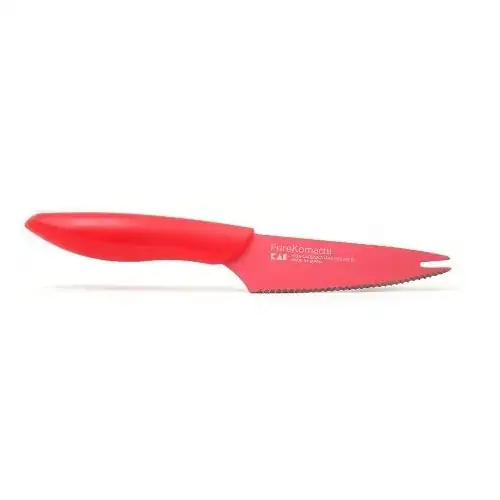Is it better to use a serrated knife, or a regular chef's knife that is really sharp?
3 Answers
A really well-sharpened santoku-style chef's knife is usually my choice. But, it does depend on the type of slicing... such as thick/thin discs, wedges, or dicing.
While I understand that a serrated blade can help with slicing a super-ripe tomato, when I want really thin disc-shaped slices, something very sharp and preferably a thinner spine. The favorite in my kitchen is definitely a Henckel santoku chef blade. Some versions can have a very thick spine, and wouldn't work as well, though. This type of choice is also more utilitarian if you're cutting any other veggies at the same time, or making additional cuts in the tomatoes, such as when you're also going to be halving the discs or full-on dicing.
Things I like the thinnest slices on are a ham and cheese melt, roast beef sammy, a sub for the road, and sometimes for a garnish. (hors d'œuvre, anyone?)
Also, when I'm cutting tomatoes into wedges, I also like to use this same type of sharp, non-serrated blade. Otherwise, I find it harder than necessary to do the smaller divisions after the 1/4-of-a-tomato size. I nearly always do 1/8 or 1/12 sized wedges for salad, so it isn't terribly often I use a "real" tomato knife. When I do, is when it's for a lunch and I don't want to sully a larger blade, or when doing large batches. Getting the core out is certainly easiest with a smaller, serrated blade.
- 1,723
- 2
- 20
- 26
-
2Sharpness is the key. A few swipes with a sharpening steel before you cut is always a good idea. – Mrs. Garden Dec 15 '10 at 16:02
-
1As zanlok said, I also use a really well-sharpened knife with a thin spine, specifically this one http://goo.gl/k3YTX or my chef's knife if that's what's in hand. I *hate* serrated blades for tomatoes, they destroy them and, as mentioned, can't slice nearly as thin. I see no reason to ever use a serrated knife for a tomato; even when the tomato is over-ripe, a properly sharpened knife will take care of it with no problem. Take a tomato to Williams-Sonoma and try a Shun or Global blade (seriously, they'll let you) and you'll wonder why anyone ever considered serrated in the first place. – stephennmcdonald Dec 15 '10 at 16:42
-
Tip for getting the core: use a grapefruit spoon (thanks, Alton). – RolandTumble Dec 16 '10 at 19:43
Anything this guy sells: http://knifewear.com/
He brings in a bag of ripe tomatoes every morning to show off his blades (and lets customers try them all). The quality of the Japanese steel makes my professional Henkels blades look like toys. He gets all of his blades direct from the masters in Japan. The blades are so sharp, they sort of just fall through the tomatoes...
I use one of these: http://knifewear.com/knife-family.asp?family=5 for most things and have another smaller paring knife to use as well.
But the point is if you use a very sharp knife, you don't need a "tomato" or serrated knife. If your sharp knife doesn't cut through the tomato, it's not sharp.
Disclaimer: I have no affiliation with Knifewear. I just made the mistake of going in one day and buying some knives from him. He has shown me the error of my ways.
- 11,188
- 3
- 37
- 62
-
1While I don't know that brand/guy specifically, +1 from me for Japanese steel. I have a huge Henckels knife block set, and various Wusthof-Trident pieces at home, and the only ones I use are my Global and Shun anymore. Sometimes I use the Henckels to chop through bone and tougher stuff, but for precision, nothing beats Japanese steel (that I've found). – stephennmcdonald Dec 15 '10 at 17:47
-
He carries various "brands", but they're all incredible. If you're ever in Calgary, I recommend stopping in for a jaw-dropping visit. – talon8 Dec 15 '10 at 18:06
-
-
A lot of what that guy sells are carbon steel knives. Carbon steel knives are great. But the combination of tomatoes and carbon steel knives is not great for everyone - a lot of attention is needed, accidentally forgetting the knife wet on a board full of tomato juices for hours is likely to have you cleaning off rust spots and resharpening the edge afterwards. Tomato juice is among the most aggressive substances we dare eating :) Now the stainless styles (in Gin-3, good VG10 etc) from that store will be ideal for the task.... – rackandboneman Jan 20 '18 at 09:17
http://en.wikipedia.org/wiki/Tomato_knife
A tomato knife is a small serrated kitchen knife designed to slice through tomatoes. The serrated edge allows the knife to penetrate the tomatoes’ skin quickly and with a minimum of pressure without crushing the flesh. Many tomato knives have forked tips that allow the user to remove the seeds more easily.
Serrations are not required to cut tomatoes – a sharp straight blade works – but the serrations allow the knife to cut tomatoes and other foods even when dull. Compare bread knife and steak knife, which are similarly serrated.
I aways use a aerated knife as it doesn't matter how soft the tomato is, it will still slice it with ease
The best tomato knife I ever had, had a high carbon steel blade about 13cm long, and only 1cm in height. The short height and the rough carbon steel surface meant that the slices didn't stick to the blade as you cut, and fell away cleanly. It broke one day when pushed to hard into soft wood chopping block. Never found another one like it
Coated knives like this should be good

-
I figure he means height since he mentions that the slice doesn't stick to blade. – johnny Dec 15 '10 at 08:11